
by Lorato | Feb 23, 2026 | Accolades and Achievements, All News, SMU Media, Student Media
Sefako Makgatho Health Sciences University (SMU) has entered a bold and transformative chapter under the leadership of its Vice-Chancellor and Principal, Professor Tandi Matsha-Erasmus, whose vision for institutional renewal, academic expansion and sustainable growth continues to reshape the trajectory of the University.
 In a landmark engagement, SMU formally visited the Professor Ephraim Thibedi Mokgokong Foundation, culminating in the signing of a strategic Memorandum of Understanding (MoU). The agreement signifies more than institutional collaboration — it represents a shared commitment to academic excellence, leadership development and meaningful community engagement in the Health Sciences.
In a landmark engagement, SMU formally visited the Professor Ephraim Thibedi Mokgokong Foundation, culminating in the signing of a strategic Memorandum of Understanding (MoU). The agreement signifies more than institutional collaboration — it represents a shared commitment to academic excellence, leadership development and meaningful community engagement in the Health Sciences.
The MoU seeks to formalise a strategic partnership that promotes joint initiatives, commemorative programmes and capacity-building efforts. It further lays the foundation for dynamic programmes to be developed through ongoing engagement with University stakeholders.
Under this agreement, the parties will collaborate to mobilise Alumni and Convocation to build a strong, engaged SMU Alumni community. They will also develop a joint framework to drive key projects, including working towards the establishment of a School of Agriculture and Veterinary Sciences, promoting research and the commercialisation of research for third-stream income, and re-establishing international partnerships to advance exchange programmes, joint research and the digitalisation of health education at SMU.
Speaking at the signing ceremony, Professor Erasmus expressed profound optimism about the future of the University. “This agreement marks a new chapter in the life of SMU. It is a declaration that we are ready to expand, innovate and lead. We are positioning SMU not only as a centre of health sciences excellence, but as a catalyst for socio-economic development,” she said. She emphasised that the partnership aligns directly with her strategic vision of strengthening institutional sustainability while broadening academic offerings.
“We are deliberate about building a university that responds to national priorities. The establishment of the School of Agriculture and Veterinary Sciences is not merely an academic ambition — it is a developmental imperative for our country.”
Professor Erasmus’s leadership has been characterised by decisive action, bold partnerships and a renewed institutional confidence. Her stewardship continues to galvanise stakeholders across sectors to rally behind SMU’s growth agenda.
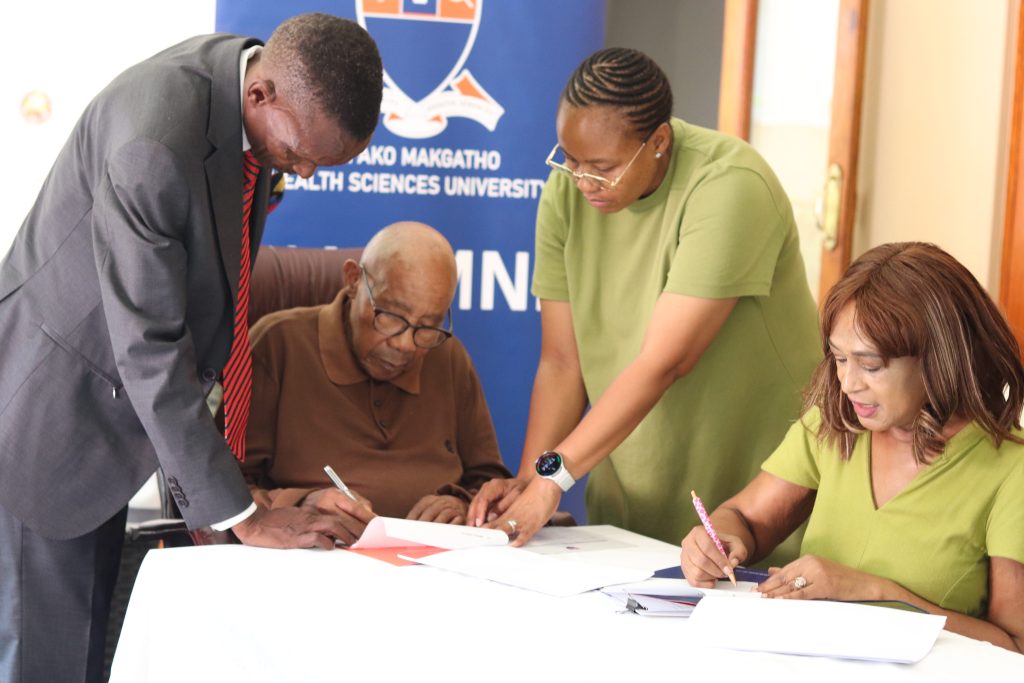 Dr Zacharia (Zakes) Kagiso Motene, Chief Executive Officer of the Foundation, affirmed the Foundation’s unwavering commitment to supporting SMU’s expansion, particularly the envisioned School of Agriculture and Veterinary Sciences.
Dr Zacharia (Zakes) Kagiso Motene, Chief Executive Officer of the Foundation, affirmed the Foundation’s unwavering commitment to supporting SMU’s expansion, particularly the envisioned School of Agriculture and Veterinary Sciences.
“As a Foundation, we will work tirelessly to ensure that the establishment of the SMU School of Agriculture and Veterinary Sciences becomes a reality. We will mobilise both the private and public sectors to support this dream,” he stated.
He underscored the Foundation’s belief in collaborative development and its readiness to leverage networks and resources to strengthen the University’s capacity and infrastructure.
The proposed School of Agriculture and Veterinary Sciences has also garnered strong sectoral support. The President of the South African Veterinary Council (SAVC), Dr Nomfundo Nomsa Mnisi , highlighted the urgent need for transformation within the veterinary profession.
“The veterinary sector continues to face a significant shortage of black professionals and students. The establishment of this School will contribute meaningfully to broadening participation and ensuring that the profession reflects the demographics of our country,” she noted.
She further affirmed the Council’s commitment to the initiative: “We are excited about this development and will walk hand in hand with both the Foundation and SMU to realise this vision.” In a deeply affirming message, Professor Ephraim Thibedi Mokgokong expressed his confidence in Professor Erasmus’s leadership and her capacity to steer the University toward sustained excellence.
“I have full confidence in the Vice-Chancellor as the first black VC of this University. She has demonstrated commitment, courage and clarity of vision. I know she will get the job done,” he said.
He also encouraged the broader SMU community to unite behind the Vice-Chancellor’s leadership. “I urge staff and students to support the Vice-Chancellor as she leads this institution into its next phase of growth. Institutional success requires collective commitment.”
The signing of this MoU signals more than collaboration — it reflects momentum. Under Professor Erasmus’s leadership, SMU is reasserting its place as a forward-looking institution committed to academic excellence, research innovation and societal impact.
By strengthening alumni networks, advancing research commercialisation, rebuilding international partnerships and expanding into Agriculture and Veterinary Sciences, SMU is positioning itself as a comprehensive, transformative university rooted in African realities and global relevance.
This partnership stands as a testament to visionary leadership and shared purpose. As Professor Erasmus continues to work diligently to elevate SMU’s profile and performance, the University community is witnessing the tangible results of strategic, focused and courageous leadership. Indeed, a new era has begun at SMU — and it is being shaped with conviction, collaboration and confidence.
By Dimakatso Modise
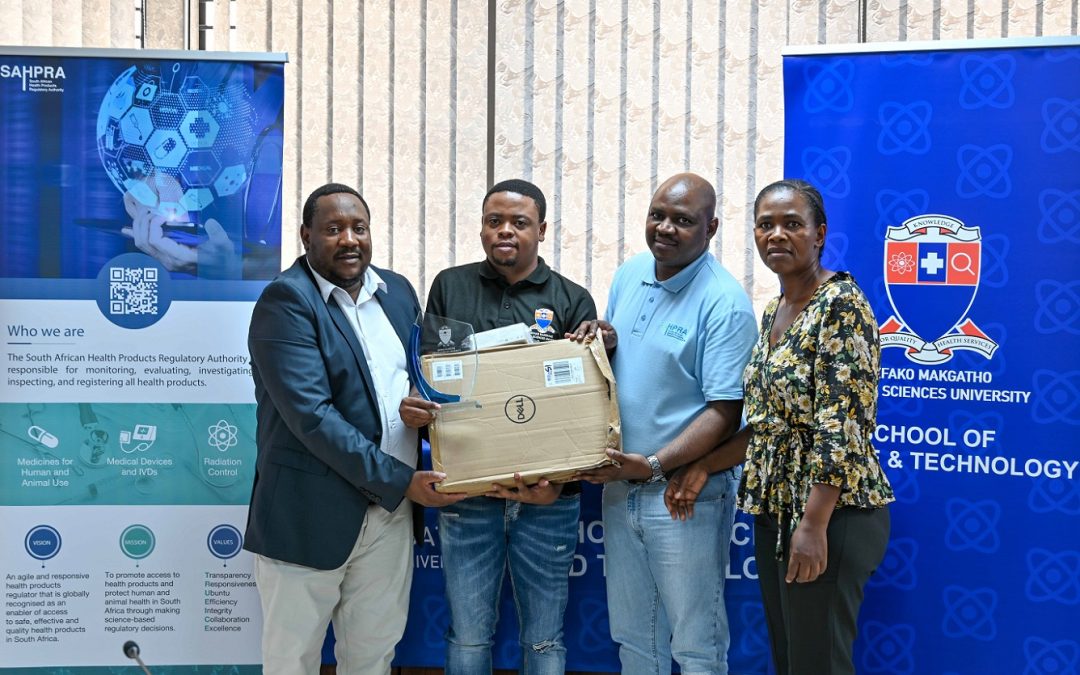
by Lorato | Feb 17, 2026 | Accolades and Achievements, All News, SMU Media, Student Media
A spirit of celebration and scholarly distinction filled the air as academic excellence took centre stage at a prestigious handover ceremony hosted by the School of Science and Technology at Sefako Makgatho Health Sciences University (SMU). The occasion marked a significant milestone in the University’s enduring partnership with the South African Health Products Regulatory Authority (SAHPRA), underscoring a shared commitment to advancing student success, innovation, and capacity development within the health sciences sector.
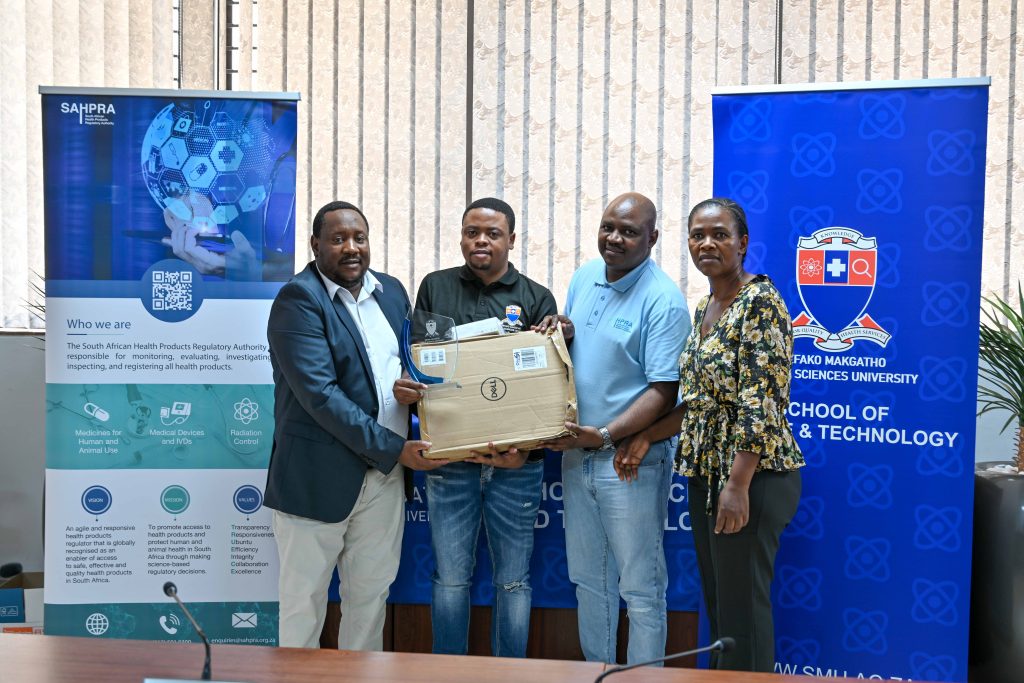 The ceremony formally acknowledged SAHPRA’s generous sponsorship towards the Dean’s Excellence Awards, through which high-performing students were awarded laptops to support their academic and research pursuits. The initiative reflects a strategic alignment between academia and regulatory institutions in cultivating a scientifically competent and ethically grounded workforce.
The ceremony formally acknowledged SAHPRA’s generous sponsorship towards the Dean’s Excellence Awards, through which high-performing students were awarded laptops to support their academic and research pursuits. The initiative reflects a strategic alignment between academia and regulatory institutions in cultivating a scientifically competent and ethically grounded workforce.
Professor Sechene Stanley Gololo, Deputy Dean of the School of Science and Technology, expressed profound gratitude for SAHPRA’s contribution and reaffirmed the value of collaborative partnerships. “Compliments of the new season. On behalf of the School of Science and Technology, please accept our sincere appreciation for SAHPRA’s generous sponsorship towards the Dean’s Excellence Awards. Your contribution is both commendable and impactful, as it meaningfully advances our shared commitment to student success, excellence, and capacity development,” he said.
Prof Gololo further highlighted the symbolic and practical importance of the handover ceremony. “To formally acknowledge this support, we deeply value the presence of SAHPRA representatives at the official handover of the laptops to the award recipients. Such engagements reinforce the strategic alignment between academia and regulatory bodies in shaping a responsive and competent scientific workforce,” he added.
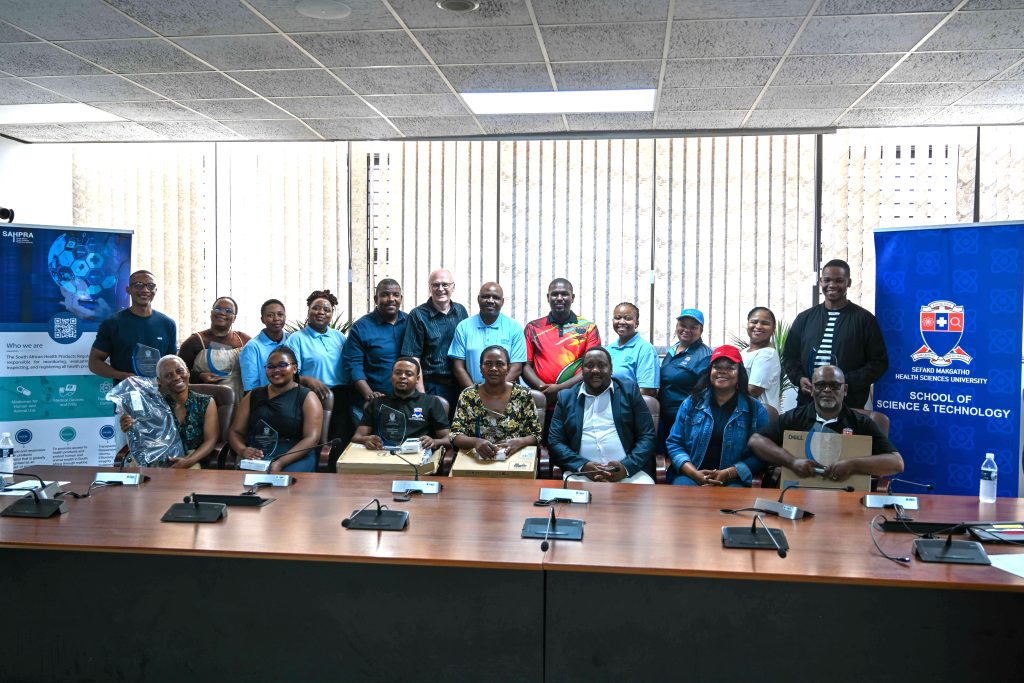 Four outstanding students were recognised during the ceremony for their exemplary academic achievements. Nkosi Lindokuhle, a Bachelor of Science (Extended Curriculum Programme) undergraduate student, was honoured for academic merit and perseverance. Pitse Thulaganyo was celebrated as the Bachelor of Science (Honours) Overall Achiever 2025, while Kekana Tumisho received recognition as Master of Science Overall Achiever 2025. In a remarkable demonstration of research innovation, Lekgoathi Thabo Lesiba was acknowledged as Patent Holder of the Year 2025.
Four outstanding students were recognised during the ceremony for their exemplary academic achievements. Nkosi Lindokuhle, a Bachelor of Science (Extended Curriculum Programme) undergraduate student, was honoured for academic merit and perseverance. Pitse Thulaganyo was celebrated as the Bachelor of Science (Honours) Overall Achiever 2025, while Kekana Tumisho received recognition as Master of Science Overall Achiever 2025. In a remarkable demonstration of research innovation, Lekgoathi Thabo Lesiba was acknowledged as Patent Holder of the Year 2025.
In line with principles of transparency and responsible stewardship, the School confirmed that four laptops were distributed at the ceremony. The remaining laptop will be retained in the Dean’s Office and allocated to a subsequent approved student support initiative, of which SAHPRA will be duly notified.
Zingisa Nodada and Khanyisile Mabuza, SAHPRA Learning and Development Specialists, delivered compelling reflections on the partnership with the University, particularly the School of Science and Technology. They emphasised that their collaboration is anchored in strengthening regulatory science, promoting skills development, and ensuring that graduates are equipped to contribute meaningfully to national health priorities.
The SAHPRA representatives noted that investing in students extends beyond financial sponsorship; it is an investment in the intellectual capital that will sustain and transform the country’s health regulatory landscape. Their remarks reaffirmed SAHPRA’s commitment to long-term academic partnerships that bridge theory and practice while nurturing excellence.
Dr Baratwa Moema, Operations Manager of the School of Science and Technology, also extended heartfelt appreciation to SAHPRA for its sustained support over the years. She acknowledged that the partnership has evolved into a dynamic and mutually beneficial relationship grounded in trust and shared vision. Dr Moema expressed optimism that the collaboration will continue to flourish, opening new avenues for student empowerment and institutional growth.
The handover ceremony thus symbolised more than the presentation of technological tools; it represented a deliberate investment in academic distinction and future innovation. Through strategic collaboration, Sefako Makgatho Health Sciences University (SMU) and SAHPRA are collectively shaping a generation of scientists equipped with the knowledge, skills, and resources required to advance health sciences in South Africa and beyond.
By Dimakatso Modise
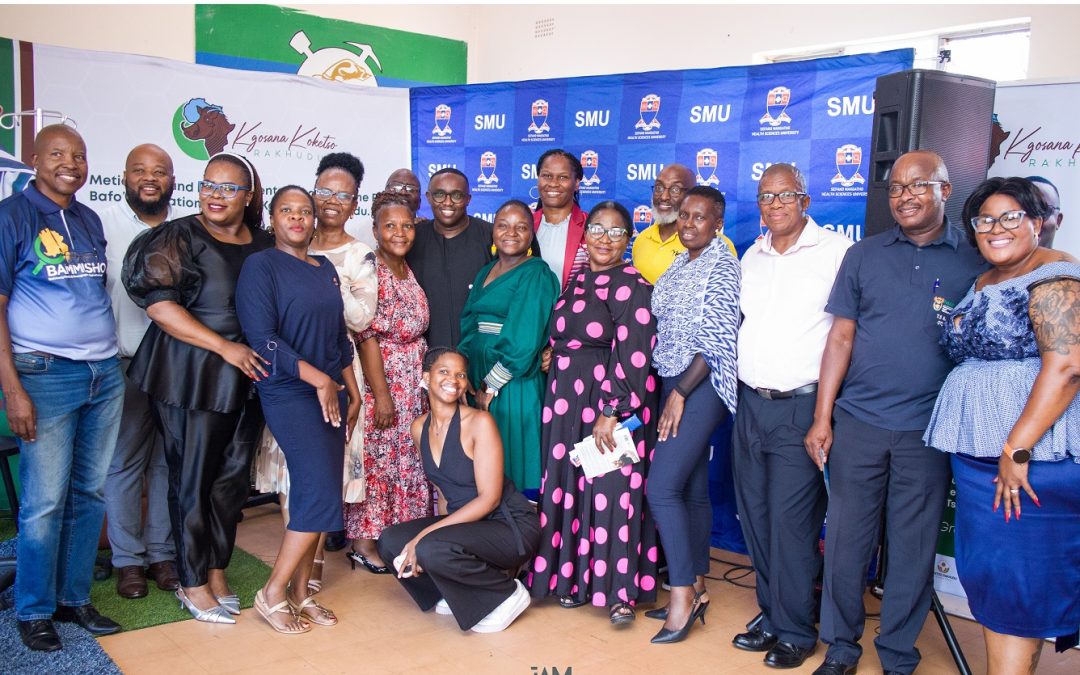
by Lorato | Feb 15, 2026 | Accolades and Achievements, All News, Alumni, SMU Media, Student Media
Sefako Makgatho Health Sciences University (SMU) reaffirmed its institutional leadership in community-centred health development during the Health Sector Stakeholders Summit held from 10 to 13 February 2026 under the theme “Strategic Collaboration for Sustainable Health Outcomes.” The four-day convergence brought together traditional authorities, government representatives, private sector companies, academics, health practitioners and community stakeholders in a unified effort to strengthen health systems, advance wellness and stimulate socio-economic progress in Tsitsing and neighbouring villages.
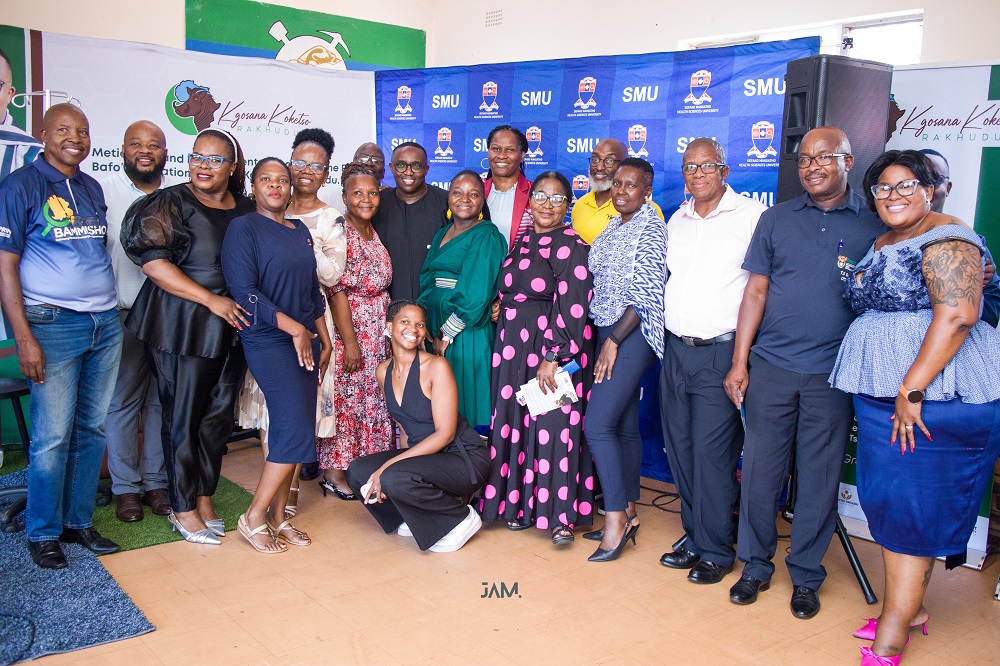 The summit coincided with the official launch of the Botsogo, Bophelo le Boitekanelo Summit 2026 by Kgosana Koketso Rakhudu of the Kgotla Ya Rakhudu, marking the commencement of a transformative partnership between traditional leadership and the university. In his opening address, Kgosana Rakhudu described the gathering as a watershed moment in the community’s developmental trajectory. “This summit represents hope translated into action,” he asserted. “It unites leadership, academia, business and the community in a shared commitment to improving health outcomes and securing a sustainable future for our villages.”
The summit coincided with the official launch of the Botsogo, Bophelo le Boitekanelo Summit 2026 by Kgosana Koketso Rakhudu of the Kgotla Ya Rakhudu, marking the commencement of a transformative partnership between traditional leadership and the university. In his opening address, Kgosana Rakhudu described the gathering as a watershed moment in the community’s developmental trajectory. “This summit represents hope translated into action,” he asserted. “It unites leadership, academia, business and the community in a shared commitment to improving health outcomes and securing a sustainable future for our villages.”
Anchored in a collaborative framework that integrates traditional leadership structures, government departments, academic institutions, non-governmental organisations, corporate partners and community formations, the initiative seeks to position Tsitsing as a demonstrative site for community-based health innovation. The active involvement of several companies underscored the growing recognition that sustainable health development requires public–private partnerships capable of mobilising financial resources, technical expertise and innovation. Through coordinated planning, evidence-driven research, capacity development and sustainable interventions, stakeholders aim to fortify primary healthcare systems, enhance service delivery efficiencies and generate enduring socio-economic dividends.
During the Stakeholder Pledge and Closing Remarks session, SMU formalised its commitment to the partnership, underscoring its enduring mandate of socially responsive scholarship. Representing the institution was Professor Mathildah Mokgatle, Head of the Department of Public Health. Prof. Mokgatle articulated the university’s conviction that sustainable transformation emerges from authentic collaboration across sectors. “As a university dedicated to advancing public health, we recognise that meaningful change occurs when institutions, business and communities work in concert,” she said. “SMU commits to supporting this ongoing partnership to strengthen local health systems and improve sustainable health outcomes.”
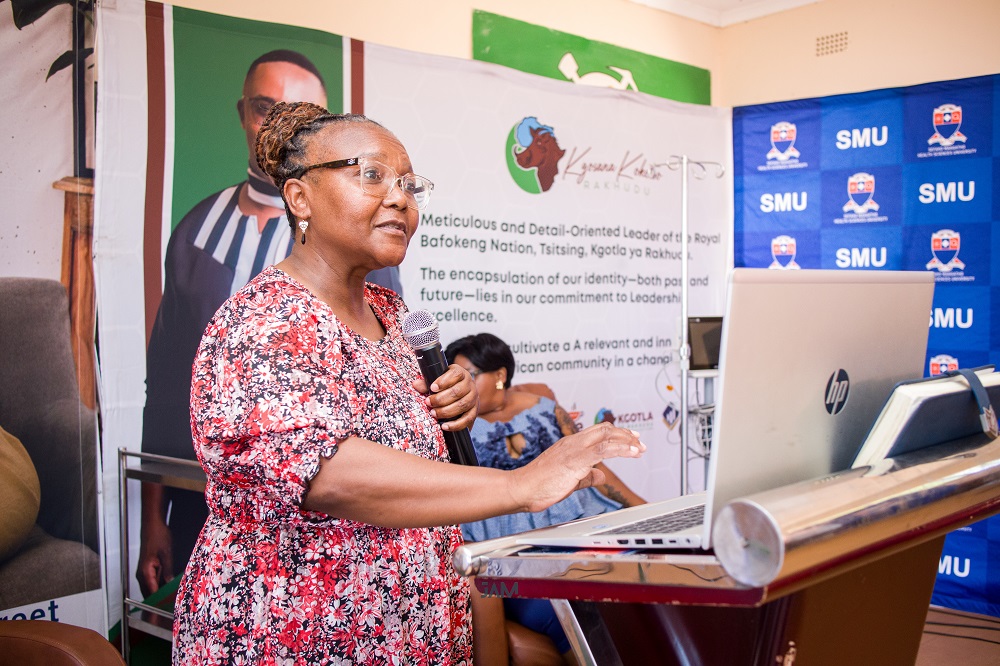 She further emphasised that the initiative would serve as a dynamic platform for community-based research, experiential student training and contextually relevant, evidence-based interventions. “Our responsibility transcends classroom instruction,” Prof. Mokgatle noted. “We must ensure that our research, training and service are intrinsically aligned with the lived realities of communities such as Tsitsing, thereby contributing directly to their health, dignity and overall wellbeing.”
She further emphasised that the initiative would serve as a dynamic platform for community-based research, experiential student training and contextually relevant, evidence-based interventions. “Our responsibility transcends classroom instruction,” Prof. Mokgatle noted. “We must ensure that our research, training and service are intrinsically aligned with the lived realities of communities such as Tsitsing, thereby contributing directly to their health, dignity and overall wellbeing.”
A defining feature of the summit was the unveiling of the 3B’s conceptual framework — Botsogo, Bophelo le Boitekanelo — spearheaded by Evah Molapisi, Lecturer in Community Physiotherapy and Rehabilitation at SMU. Molapisi elucidated that the framework encapsulates an integrated vision of health, life and holistic wellness as interdependent pillars of community advancement. “Botsogo speaks to health, Bophelo to life, and Boitekanelo to comprehensive wellness,” she explained. “These principles remind us that health is not merely the absence of illness, but the presence of empowerment, opportunity and human dignity.”
The 3B’s vision aspires to cultivate sustainable community–academic partnerships, advance Sustainable Development Goal 3 on Good Health and Well-being, stimulate youth participation in health professions and establish a viable community-based platform for student training and service delivery. By embedding academic expertise within community contexts while drawing on the innovation and support of corporate stakeholders, the initiative seeks to bridge the divide between theory and practice, ensuring that scholarship translates into measurable social impact.
Complementing the health systems discourse, Moagisi Edwin Seleka, Senior Lecturer and Head of Department at SMU, contributed a reflective exploration of the therapeutic dimensions of arts and bibliotherapy. Dr Seleka illuminated the intricate interrelationship between mental and physical health, underscoring the physiological benefits of creative engagement. “The body and mind function synergistically,” he observed. “Music and humour stimulate the release of endorphins, thereby alleviating pain and mitigating stress.”
Expanding on the transformative potential of reading and artistic expression, he added, “To read is to journey beyond one’s immediate circumstances; it is to encounter new perspectives and possibilities. Creative expression enlarges the imagination, fosters emotional resilience and facilitates psychological restoration.” His insights reinforced the summit’s holistic orientation, recognising that sustainable health outcomes necessitate attention to both corporeal and psychosocial dimensions of wellbeing.
As proceedings concluded, the Health Sector Stakeholders Summit emerged as a seminal platform for structured, long-term collaboration. By harmonising academic rigour, traditional governance, corporate participation and community engagement, the initiative presents a replicable model for inclusive, sustainable health development. Through its active involvement and formal pledge, Sefako Makgatho Health Sciences University has once again demonstrated its unwavering commitment to advancing equitable health outcomes and fostering resilient communities across South Africa.
By Dimakatso Modise
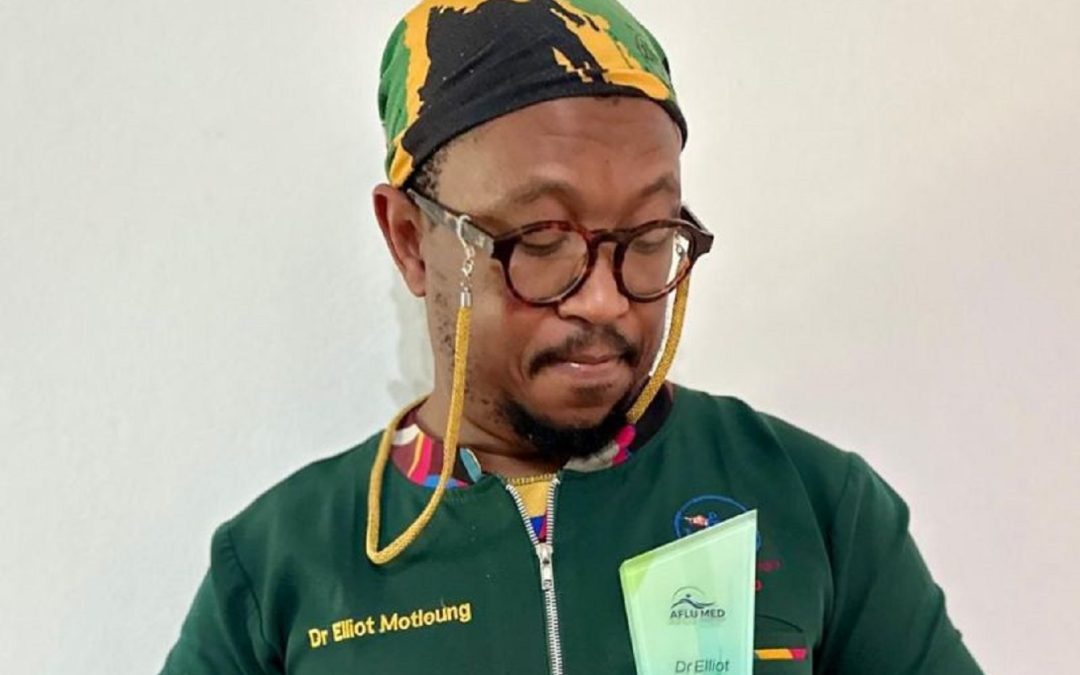
by Lorato | Feb 5, 2026 | Accolades and Achievements, All News, Alumni, SMU Media, Student Media
Aflu Med Healthcare has named Dr Elliot Motloung, Head of the Department of Paediatric Surgery at Sefako Makgatho Health Sciences University (SMU), as its 2025 Digital Healthcare Champion, recognising a clinician whose work is changing how paediatric surgery is taught, delivered and accessed across South Africa.
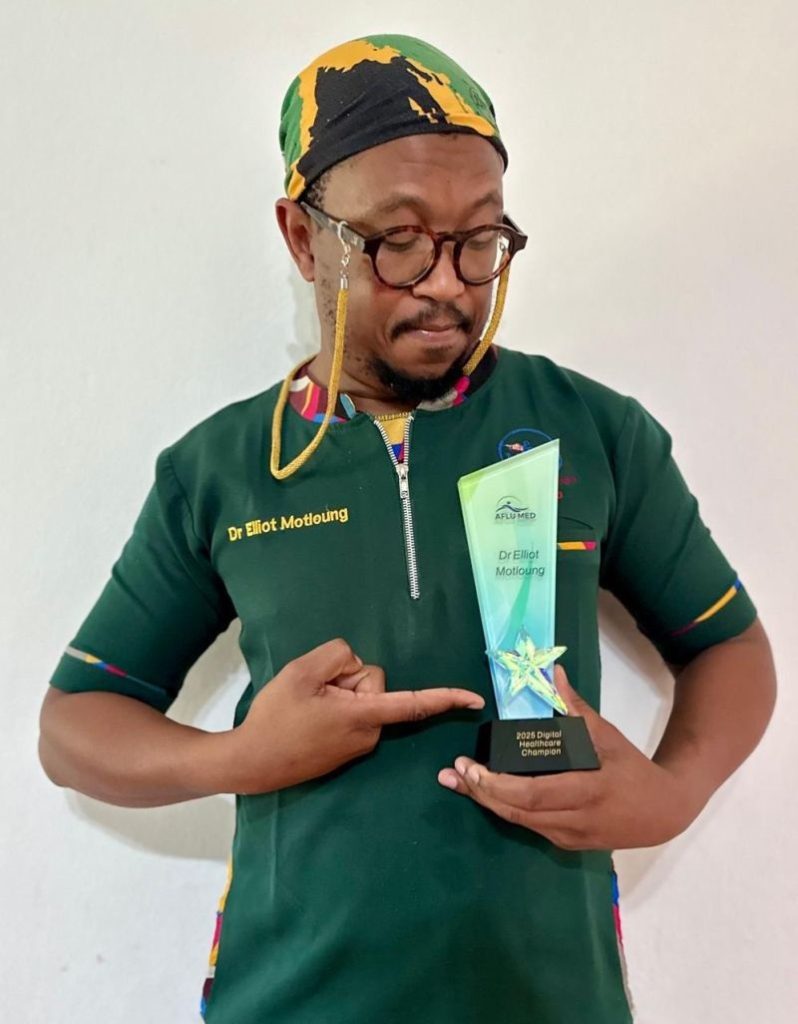 The award celebrates leadership that converts innovation into real-world impact. Dr Motloung’s career does exactly that. Known for decisive action in high-stakes clinical environments, he has built a body of work guided by a clear conviction: healthcare must be excellent, equitable and built for the future.
The award celebrates leadership that converts innovation into real-world impact. Dr Motloung’s career does exactly that. Known for decisive action in high-stakes clinical environments, he has built a body of work guided by a clear conviction: healthcare must be excellent, equitable and built for the future.
Aflu Med Healthcare is a South African health-technology company delivering integrated digital and mobile solutions to improve healthcare delivery and access. Its HealthSpace Ecosystem provides a centralised electronic health record and practice management platform that supports telehealth, clinical workflows, patient engagement, and data-driven decision-making. The company also offers business development support to healthcare providers and deploys mobile clinics that extend primary healthcare and outreach services into underserved communities.
At the centre of Dr Motloung’s impact is surgical education. He pioneered South Africa’s first Neonatal Surgical Skills Course, developed in partnership with the University of Oxford. Using simulation-based training, the programme equips surgeons with critical neonatal skills before they enter the operating theatre.
“In neonatal surgery, preparation is everything,” Dr Motloung said. “Simulation allows surgeons to build confidence and competence without placing patients at risk. That shift saves lives.”
The course has set a new national benchmark, enhancing patient safety in a discipline where the margin for error is razor-thin.
Access to care is another defining pillar of his work. Determined that geography should not dictate survival, Dr Motloung played a key role in establishing public paediatric surgical units in underserved provinces, including Limpopo and Mpumalanga. These facilities have reduced the burden on families who previously travelled long distances for specialist treatment.
“No child should suffer because care is too far away,” he said. “Bringing services closer to communities changes outcomes—and dignity.”
Clinically, Dr Motloung is widely respected for his expertise in minimally invasive thoraco-abdominal surgery, paediatric trauma and advanced laparoscopic techniques. These approaches reduce pain, shorten hospital stays and speed up recovery—critical benefits for children and overstretched health systems alike.
What truly distinguishes Dr Motloung, however, is his purpose. Shaped by first-hand exposure to healthcare inequity, his mission is rooted in service to rural and marginalised communities. He has translated that commitment into a clear, scalable blueprint for paediatric surgical care that reaches beyond urban centres.
Alongside his clinical leadership, he is an influential academic mentor. Through structured training programmes and hands-on supervision, he is developing the next generation of paediatric surgeons, strengthening surgical capacity nationally and regionally.
“Training people is how impact multiplies,” Dr Motloung said. “If we invest in skills today, patients benefit for decades.”
In naming Dr Motloung as the 2025 Digital Healthcare Champion, Aflu Med Healthcare recognises a leader who does not merely respond to change—he drives it. His work continues to raise standards, inspire clinicians and reshape health systems, proving that true progress in healthcare is measured not by innovation alone, but by lives improved and futures secured.
By Tumelo Moila
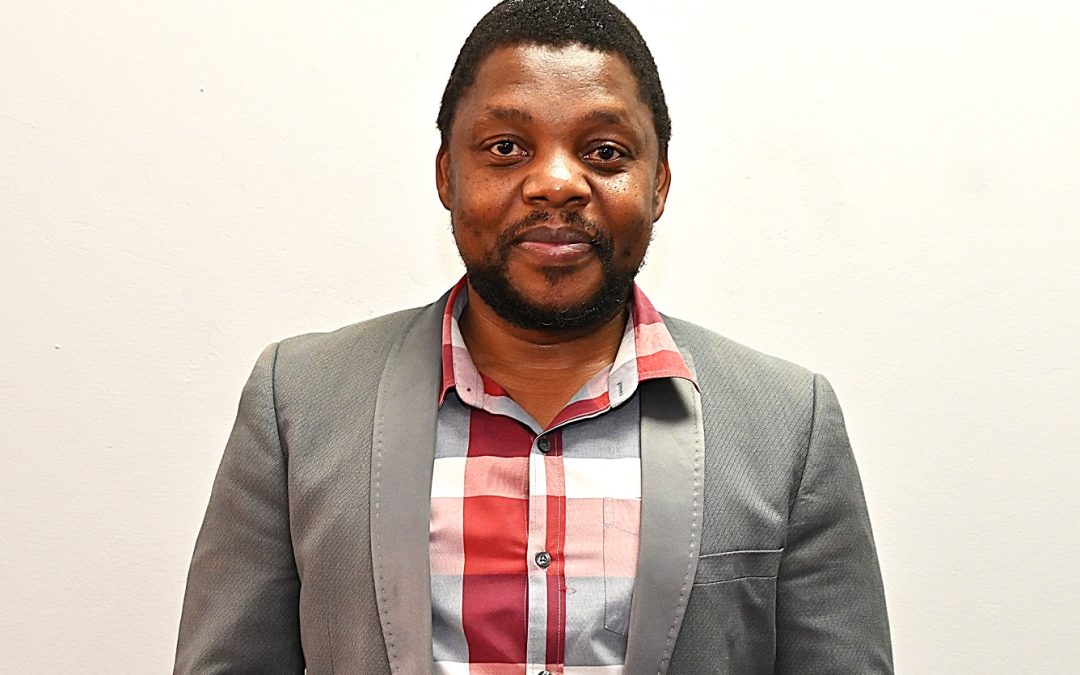
by Lorato | Jan 30, 2026 | Accolades and Achievements, All News, Alumni, SMU Media, Student Media
Sefako Makgatho Health Sciences University (SMU) continues to strengthen its research footprint on the global stage, as two of its distinguished chemistry professors—Professor Tshwafo Motaung and Professor Phumlani Mdluli—take the helm as Guest Editors of a Hot Topic Collection in Springer Nature’s Discover Applied Sciences. The newly launched Collection, Chemistry: Sustainable Materials and Circular Economy: Innovations in Biomass, Water Treatment, and Renewable Energy, is now open for submissions until 31 August 2026.
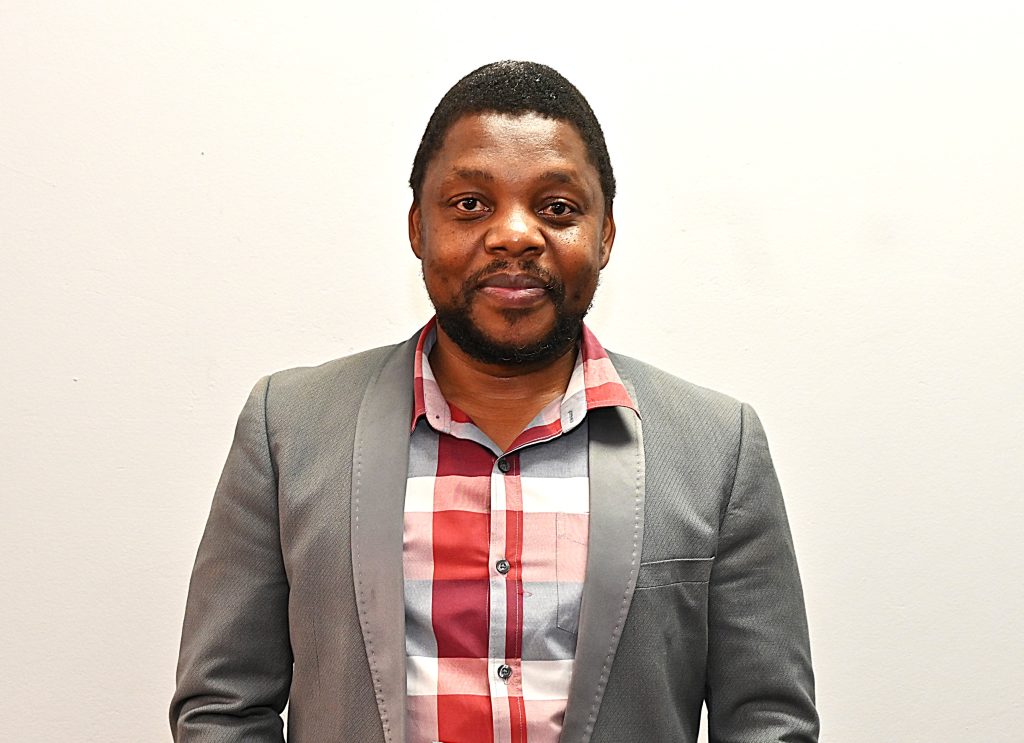 Both professors bring deep expertise and bold research visions to a platform read by hundreds of thousands of researchers worldwide. Their leadership elevates SMU’s profile while guiding a global discussion on how applied chemistry can deliver real environmental solutions.
Both professors bring deep expertise and bold research visions to a platform read by hundreds of thousands of researchers worldwide. Their leadership elevates SMU’s profile while guiding a global discussion on how applied chemistry can deliver real environmental solutions.
Professor Motaung, an expert in organic polymer chemistry, nanocomposites, and waste-stream innovation, emphasised the urgency of the work ahead. “We cannot afford slow science in a fast-changing world,” he said. “Our goal is simple: convert knowledge into innovations that make a measurable difference to people, industries, and the environment.” Known for his commitment to translating scientific and indigenous knowledge into high-impact solutions, he believes Africa has a critical role to play in global sustainability efforts.
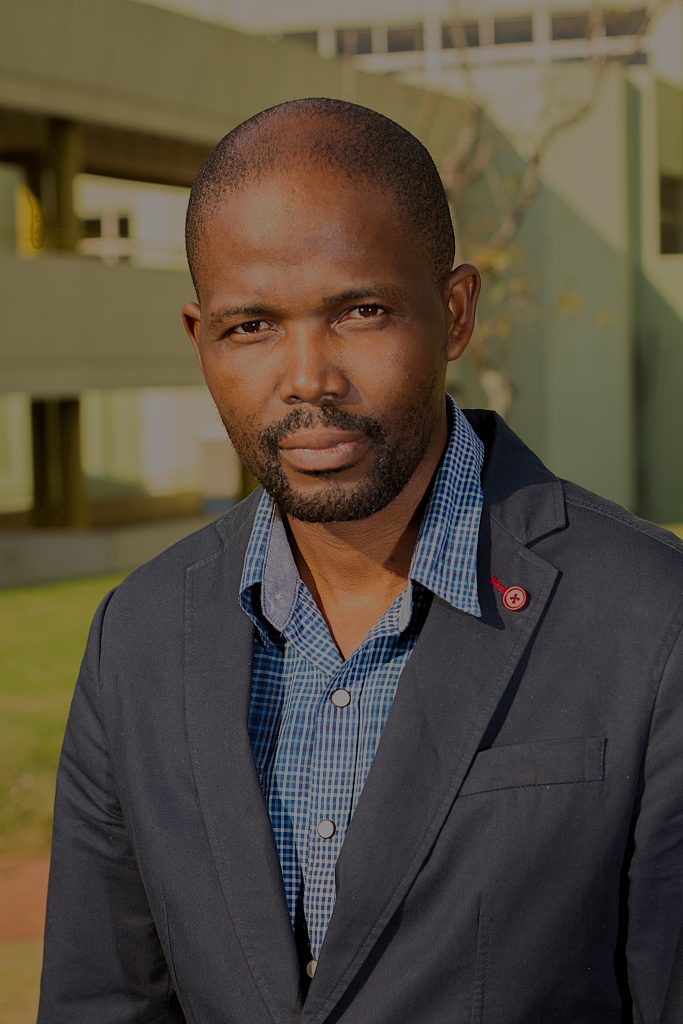 Professor Mdluli, whose research focuses on nanomaterials for diagnostics, water treatment, and renewable energy, highlighted the Collection’s emphasis on practical relevance. “This isn’t just about publishing research—it’s about accelerating technologies that can be deployed in real communities,” he explained. “Chemistry has the power to reshape how we use resources, recover waste, and build a circular economy.” He added that integrating molecular modelling into applied research will help scientists design smarter, more efficient materials.
Professor Mdluli, whose research focuses on nanomaterials for diagnostics, water treatment, and renewable energy, highlighted the Collection’s emphasis on practical relevance. “This isn’t just about publishing research—it’s about accelerating technologies that can be deployed in real communities,” he explained. “Chemistry has the power to reshape how we use resources, recover waste, and build a circular economy.” He added that integrating molecular modelling into applied research will help scientists design smarter, more efficient materials.
Springer Nature has welcomed the collaboration, noting the important stewardship role played by editors. Yidan Xu, Managing Editor at Discover Applied Sciences, said: “Editors are the guardians of quality. We rely on experts like Professors Tshwafo and Mdluli to uphold rigorous standards and guide impactful research to publication. Their leadership strengthens the trust our authors and readers place in us.”
The Hot Topic Collection arrives at a crucial moment. As nations face mounting pressure from climate change, water scarcity, and energy demand, applied chemistry offers a pathway to scalable, science-driven solutions. The Collection spotlights innovations in biomass utilisation, pollutant degradation, polymer and composite development, catalytic materials, and pilot-scale demonstrations that bridge laboratory discoveries with industry and community application.
By emphasising translational value, the Collection seeks to inspire work that delivers real-world impact. It also contributes to several United Nations Sustainable Development Goals, including SDG 6 (Clean Water and Sanitation), SDG 7 (Affordable and Clean Energy) and SDG 9 (Industry, Innovation and Infrastructure).
Discover Applied Sciences—a multidisciplinary open-access journal with more than 4.9 million downloads in 2024—offers rapid processing, with a median submission-to-decision time of just 14 days. Researchers contributing to the Collection will benefit from high visibility and a global readership.
As Motaung concluded, “This is more than a scholarly Collection—it’s a call to action for chemists worldwide.”
By Tumelo Moila
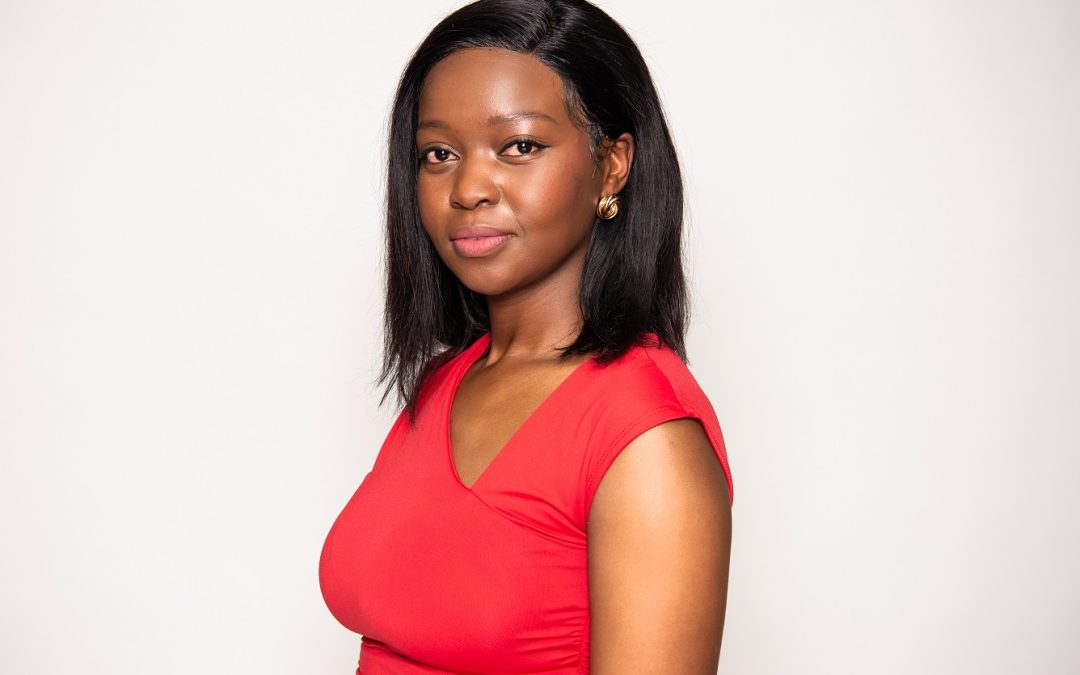
by Lorato | Jan 11, 2026 | Accolades and Achievements, All News, Alumni, SMU Media, Student Media
Nondumiso Nkosi, a Master’s student in Medical Virology at Sefako Makgatho Health Sciences University (SMU), is making waves in biomedical innovation with a pioneering diagnostic assay for Hepatitis B. Developed in collaboration with Nagoya City University Hospital in Japan, her assay addresses a long-standing gap in accessible and efficient Hepatitis B diagnosis—particularly in regions where the disease is most prevalent.
 The innovation holds immense promise for transforming public health outcomes in Africa. With millions affected by chronic Hepatitis B Virus (HBV) infections that often lead to liver disease, cirrhosis, or hepatocellular carcinoma, early diagnosis is critical. Nkosi’s diagnostic tool is designed for low-resource settings, offering a potentially life-saving solution where conventional diagnostic infrastructure is either limited or absent.
The innovation holds immense promise for transforming public health outcomes in Africa. With millions affected by chronic Hepatitis B Virus (HBV) infections that often lead to liver disease, cirrhosis, or hepatocellular carcinoma, early diagnosis is critical. Nkosi’s diagnostic tool is designed for low-resource settings, offering a potentially life-saving solution where conventional diagnostic infrastructure is either limited or absent.
Her work has already earned national attention. In 2023, Nkosi presented the innovation at the Bio Africa Convention, where she was awarded runner-up in the innovation showcase. “That moment changed everything for me,” Nkosi reflects. “It made me realise the magnitude and potential impact of my work.”
With the mentorship of Dr Omphile Simani, and support from the SMU Technology Transfer Office (TTO), Nkosi’s innovation is now on the path toward commercialisation. “We are working with Nkosi and Simani to identify industry partners for scaling the assay,” says Mohlatlego Sebola of the TTO. The Office has also played a key role in securing intellectual property protection for her work, positioning her as a rising figure in South Africa’s intellectual property landscape.
SMU Vice-Chancellor, Professor Tandi Matsha-Erasmus, underscores the broader significance: “Our commitment at SMU is clear—we nurture innovation, excellence, and community service. Nkosi’s work is a shining example of this mission in action.”
But Nkosi’s story begins far from the laboratories and conferences. Raised by a single mother in Mpumalanga, she speaks openly about the challenges that shaped her. “My mother taught me strength, resilience and the value of education—no matter the odds,” she shares. “Those lessons carried me from the classroom, where I first discovered biology, to the lab, where I found my passion for medical virology.”
Navigating the complex world of science as a young woman, Nkosi faced the familiar struggle of balancing multiple roles. “Women are often expected to be everything at once—caregivers, professionals, daughters, partners, scholars,” she says. “At times, I felt pulled in every direction, but it was in those moments that my purpose became clear.”
Her determination culminated in a patented innovation, a rare and remarkable achievement for a young scientist. “To have my name on a patent is more than professional validation; it’s a statement that women belong at the forefront of scientific discovery.”
Nkosi’s journey is far from over, but her message is already resonating with many. “Your background doesn’t define your limits,” she says to young women pursuing careers in science. “You belong. Your resilience and your voice matter.”
By Dimakatso Modise

 In a landmark engagement, SMU formally visited the Professor Ephraim Thibedi Mokgokong Foundation, culminating in the signing of a strategic Memorandum of Understanding (MoU). The agreement signifies more than institutional collaboration — it represents a shared commitment to academic excellence, leadership development and meaningful community engagement in the Health Sciences.
In a landmark engagement, SMU formally visited the Professor Ephraim Thibedi Mokgokong Foundation, culminating in the signing of a strategic Memorandum of Understanding (MoU). The agreement signifies more than institutional collaboration — it represents a shared commitment to academic excellence, leadership development and meaningful community engagement in the Health Sciences. Dr Zacharia (Zakes) Kagiso Motene, Chief Executive Officer of the Foundation, affirmed the Foundation’s unwavering commitment to supporting SMU’s expansion, particularly the envisioned School of Agriculture and Veterinary Sciences.
Dr Zacharia (Zakes) Kagiso Motene, Chief Executive Officer of the Foundation, affirmed the Foundation’s unwavering commitment to supporting SMU’s expansion, particularly the envisioned School of Agriculture and Veterinary Sciences.

 The ceremony formally acknowledged SAHPRA’s generous sponsorship towards the Dean’s Excellence Awards, through which high-performing students were awarded laptops to support their academic and research pursuits. The initiative reflects a strategic alignment between academia and regulatory institutions in cultivating a scientifically competent and ethically grounded workforce.
The ceremony formally acknowledged SAHPRA’s generous sponsorship towards the Dean’s Excellence Awards, through which high-performing students were awarded laptops to support their academic and research pursuits. The initiative reflects a strategic alignment between academia and regulatory institutions in cultivating a scientifically competent and ethically grounded workforce. Four outstanding students were recognised during the ceremony for their exemplary academic achievements. Nkosi Lindokuhle, a Bachelor of Science (Extended Curriculum Programme) undergraduate student, was honoured for academic merit and perseverance. Pitse Thulaganyo was celebrated as the Bachelor of Science (Honours) Overall Achiever 2025, while Kekana Tumisho received recognition as Master of Science Overall Achiever 2025. In a remarkable demonstration of research innovation, Lekgoathi Thabo Lesiba was acknowledged as Patent Holder of the Year 2025.
Four outstanding students were recognised during the ceremony for their exemplary academic achievements. Nkosi Lindokuhle, a Bachelor of Science (Extended Curriculum Programme) undergraduate student, was honoured for academic merit and perseverance. Pitse Thulaganyo was celebrated as the Bachelor of Science (Honours) Overall Achiever 2025, while Kekana Tumisho received recognition as Master of Science Overall Achiever 2025. In a remarkable demonstration of research innovation, Lekgoathi Thabo Lesiba was acknowledged as Patent Holder of the Year 2025.
 The summit coincided with the official launch of the Botsogo, Bophelo le Boitekanelo Summit 2026 by Kgosana Koketso Rakhudu of the Kgotla Ya Rakhudu, marking the commencement of a transformative partnership between traditional leadership and the university. In his opening address, Kgosana Rakhudu described the gathering as a watershed moment in the community’s developmental trajectory. “This summit represents hope translated into action,” he asserted. “It unites leadership, academia, business and the community in a shared commitment to improving health outcomes and securing a sustainable future for our villages.”
The summit coincided with the official launch of the Botsogo, Bophelo le Boitekanelo Summit 2026 by Kgosana Koketso Rakhudu of the Kgotla Ya Rakhudu, marking the commencement of a transformative partnership between traditional leadership and the university. In his opening address, Kgosana Rakhudu described the gathering as a watershed moment in the community’s developmental trajectory. “This summit represents hope translated into action,” he asserted. “It unites leadership, academia, business and the community in a shared commitment to improving health outcomes and securing a sustainable future for our villages.” She further emphasised that the initiative would serve as a dynamic platform for community-based research, experiential student training and contextually relevant, evidence-based interventions. “Our responsibility transcends classroom instruction,” Prof. Mokgatle noted. “We must ensure that our research, training and service are intrinsically aligned with the lived realities of communities such as Tsitsing, thereby contributing directly to their health, dignity and overall wellbeing.”
She further emphasised that the initiative would serve as a dynamic platform for community-based research, experiential student training and contextually relevant, evidence-based interventions. “Our responsibility transcends classroom instruction,” Prof. Mokgatle noted. “We must ensure that our research, training and service are intrinsically aligned with the lived realities of communities such as Tsitsing, thereby contributing directly to their health, dignity and overall wellbeing.”
 The award celebrates leadership that converts innovation into real-world impact. Dr Motloung’s career does exactly that. Known for decisive action in high-stakes clinical environments, he has built a body of work guided by a clear conviction: healthcare must be excellent, equitable and built for the future.
The award celebrates leadership that converts innovation into real-world impact. Dr Motloung’s career does exactly that. Known for decisive action in high-stakes clinical environments, he has built a body of work guided by a clear conviction: healthcare must be excellent, equitable and built for the future.
 Both professors bring deep expertise and bold research visions to a platform read by hundreds of thousands of researchers worldwide. Their leadership elevates SMU’s profile while guiding a global discussion on how applied chemistry can deliver real environmental solutions.
Both professors bring deep expertise and bold research visions to a platform read by hundreds of thousands of researchers worldwide. Their leadership elevates SMU’s profile while guiding a global discussion on how applied chemistry can deliver real environmental solutions. Professor Mdluli, whose research focuses on nanomaterials for diagnostics, water treatment, and renewable energy, highlighted the Collection’s emphasis on practical relevance. “This isn’t just about publishing research—it’s about accelerating technologies that can be deployed in real communities,” he explained. “Chemistry has the power to reshape how we use resources, recover waste, and build a circular economy.” He added that integrating molecular modelling into applied research will help scientists design smarter, more efficient materials.
Professor Mdluli, whose research focuses on nanomaterials for diagnostics, water treatment, and renewable energy, highlighted the Collection’s emphasis on practical relevance. “This isn’t just about publishing research—it’s about accelerating technologies that can be deployed in real communities,” he explained. “Chemistry has the power to reshape how we use resources, recover waste, and build a circular economy.” He added that integrating molecular modelling into applied research will help scientists design smarter, more efficient materials.
 The innovation holds immense promise for transforming public health outcomes in Africa. With millions affected by chronic Hepatitis B Virus (HBV) infections that often lead to liver disease, cirrhosis, or hepatocellular carcinoma, early diagnosis is critical. Nkosi’s diagnostic tool is designed for low-resource settings, offering a potentially life-saving solution where conventional diagnostic infrastructure is either limited or absent.
The innovation holds immense promise for transforming public health outcomes in Africa. With millions affected by chronic Hepatitis B Virus (HBV) infections that often lead to liver disease, cirrhosis, or hepatocellular carcinoma, early diagnosis is critical. Nkosi’s diagnostic tool is designed for low-resource settings, offering a potentially life-saving solution where conventional diagnostic infrastructure is either limited or absent.